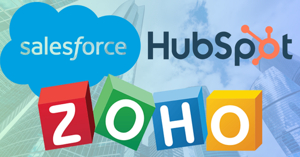
Best 10 CRM Tools: Applications & Benefits
In today's highly competitive business world, building strong customer relationships is key to achieving long-term success. Whether it is a startup, mid-sized firm, or global company, integrating appropriate CRM tools can make a significant difference in how you manage customers, track leads, and automate sales processes. With the growing need for customer-centric approaches, modern CRM platforms have become the backbone of sales, marketing, and support operations. Choosing the best CRM for small business or even for larger enterprises can become a game-changer for organizational growth.
These advanced solutions help organizations refine workflows, dig deep into customer data, improve communication, and ultimately drive more revenue. In this comprehensive guide, we discuss why CRM systems are important, how to select the best solution, and a handpicked list of the top 10 CRM tools you should consider for your business.
Table Of Content
Why CRM Tools Are Important for Organizations
Applications of CRM Tools in Modern Businesses
How to Choose the Best CRM Tools
Top 10 CRM Tools: Features, Applications & Benefits
Benefits of Using CRM Tools
Conclusion
Frequently Asked Questions
Why CRM Tools Are Important for Organizations

A well-implemented CRM helps organizations understand customer behavior and high-value leads, ensuring timely follow-ups. It also integrates sales, marketing, and support teams through which transparent communications and seamless collaboration can be performed. The right CRM tools provide real-time insights that help leaders make informed decisions directly impacting revenues and customer satisfaction.
Further, CRM systems automate a great deal of the tasks that people do manually, freeing time and enhancing productivity. Be it email campaign management or lead nurturing, CRM platforms ensure nothing falls between the cracks. If you’re searching for the best CRM for small business, choosing the right tool can significantly elevate customer engagement.
Applications of CRM Tools in Modern Businesses
A major advantage of using CRM is its integration capabilities. The best CRM for users in the small business scenario allows integration with email marketing tools, website payment gateways, and communication platforms easily. Companies can also use CRM tools to manage customer service operations via ticketing systems, chatbots, and helpdesk automation. These features bring efficiency in support delivery and enhance customer satisfaction.
Analytics is another powerful component of CRM. Advanced CRM platforms help businesses identify customer trends, optimize sales funnels, and measure campaign performance. If you’re looking for the best CRM for small business, understanding these applications can help you make a smarter investment.
How to Choose the Best CRM Tools
Next, think about scalability: your CRM should grow with your business without causing interruptions. Take a closer look at the pricing plans and subscription models to make sure it remains affordable in the long run. The right CRM tools must support mobile access, enabling teams to work efficiently on the go. Many CRM platforms nowadays offer mobile apps that fit seamlessly into remote work. Finding the best CRM for small business requires striking a balance between functionality, cost, and ease of use. Don’t hesitate to do free trials or demos of the software. This helps you test whether the tool fits into your workflow and contains all the features you need. Additionally, consider customer support: reliable service ensures smoother implementation of the CRM tools.
Top 10 CRM Tools: Features, Applications & Benefits
1. HubSpot CRM
HubSpot CRM is one of the most used CRM tools in the world. Its features are very powerful and free. The main abilities it can provide are contact management, email tracking, live chat, and marketing automation. Companies love the intuitive interface of the CRM platform, making it perfect for beginners. Many experts say that HubSpot is the best CRM for a small business because of the affordability and ease of use it offers.
2. Salesforce CRM
Salesforce is one of the leading enterprise-grade CRM solutions, offering advanced automation, analytics, and AI-powered insights. Its CRM tools are feature-rich and customizable, hence perfect for large teams. The platform offers a wide suite of modules, including sales cloud and service cloud. Most organizations working with CRM platforms depend on Salesforce because it allows them to scale and integrate with third-party offerings. Although it may not be the best CRM solution for small businesses due to its price, it is ideal for fast-growing businesses.
3. Zoho CRM
Zoho CRM is an economical tool that provides sales automation, lead management, and multichannel communication. The smooth interface and a budget-friendly plan make it a favorite among companies seeking efficient CRM tools. The Zoho ecosystem includes email, accounting, and HR tools that make it one of the most comprehensive CRM platforms out there. Generally speaking, it is considered the best CRM for small business because it is affordable.

4. Freshsales (Freshworks CRM)
For instance, Freshsales offers AI-based lead scoring, email automation, and pipeline management. These features in a CRM system will ensure that the organizations harness better prospects. Freshsales seamlessly integrates with other products by Freshworks. This makes it one of the most versatile CRM platforms out there. For small teams looking to get advanced features, it may be well-suited and a top contender for the best CRM for small business.
5. Pipedrive CRM
Pipedrive is a visually intuitive CRM renowned for its drag-and-drop pipeline management. These CRM tools help the sales teams stay focused and organized. Furthermore, Pipedrive offers automation, reporting, and sales forecasting features. Out of numerous CRM platforms, Pipedrive tops the list with its simplicity, thus being a good option for the best CRM for small business.
6. Monday.com CRM
Monday.com is a customizable work OS that also functions as a CRM. It allows teams to track leads, automate tasks, and collaborate efficiently. The CRM tools here are built on flexible boards, making them unique in structure. Companies using CRM platforms like Monday.com can easily tailor workflows. It’s increasingly seen as the best CRM for small business because of its simplicity.
7. Insightly CRM
Insightly provides powerful project management together with CRM features, thus making it ideal for service-based businesses. Its CRM tools include linking relationships, workflow automation, and detailed reporting. Most businesses focus on those CRM platforms where project tracking can be combined with customer management. Insightly can be one of the best CRM options for small business firms offering professional services.
8. Keap (Infusionsoft)
Keap is pretty powerful in automation, especially for marketing-driven businesses. Its CRM tools include automated follow-ups, invoicing, and payment integrations. For many startups, this kind of CRM platform is in demand to lessen repetitive tasks. It is considered one of the best CRMs for a small business involved in e-commerce.
9. Agile CRM
Agile CRM has been a popular platform for its all-in-one approach to sales, marketing, and service automation. Using these CRM tools, small teams can effectively manage contacts, run email marketing, and automate workflows. Being one of the most cost-effective CRM platforms, Agile can be suitable for startups and is often selected as the best CRM for small businesses.
10. Microsoft Dynamics 365
Microsoft Dynamics offers enterprise-level CRM capabilities that have deep integrations across Microsoft tools, such as Teams and Outlook. These CRM tools are popular in global companies that need advanced analytics. Many big enterprises prefer CRM platforms like Dynamics for scalability. Though more enterprise-focused, it can still be adapted as the best CRM for small businesses with growing needs.
Benefits of Using CRM Tools
Employing CRM systems offers a host of benefits to enterprises of all sizes. Equipped with proper CRM tools, businesses can enhance sales productivity and maintain consistent customer relationships. The integrated environment of modern CRM platforms facilitates transparency across teams. For startups looking for the best CRM for small business operations, these advantages significantly enhance growth.
CRM software eliminates mundane, repetitive tasks with automatic processes, giving way to faster lead conversion and enhanced customer retention. Furthermore, insights provided through analytics offer actionable advice for better marketing strategies and sales forecasting. With CRM platforms, companies are well-equipped to gain insight into and tailor personalized experiences through better visibility of customer behavior. Identifying the best CRM for small business owners can be helpful for prioritizing efficiency and cost-effectiveness.
Conclusion
Customer relationships ensure the success of any business in this digital age. The ultimate way to outcompete, keep organized, and maintain a customer-centric approach lies in selecting the appropriate CRM tools for the task. With so many powerful CRM platforms at the disposal of businesses today, enterprises can find solutions that fit their needs and budgets. Whether you’re searching for the best CRM for small business or seeking enterprise solutions, the clarity provided by this guide will help you make your choice.
Frequently Asked Questions

